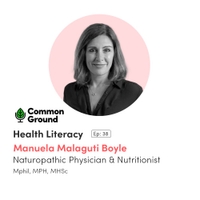
Listen on Amazon music | Apple Podcasts | Google Podcast | Spotify
Wendy McLean (00:06): Welcome to Common Ground, a podcast series discussing new research and interesting projects in the field of complementary medicine. Hello, my name is Wendy McLean, Senior Writer & Presenter at vital.ly.
vital.ly is a digital platform, a health professional resource, and a distribution service all in one.
Firstly, I'd like to begin by acknowledging the Gadigal people of the Eora Nation as the traditional custodians of the land on which we gather here. I would also like to pay my respect to their elders, past, present, and emerging.
Today on Common Ground I will be speaking with Rhiannon Hardingham on the effects of COVID-19 on fertility outcomes, with a focus on male fertility.
Rhiannon is a highly experienced fertility naturopath, presenter, practitioner educator, mentor and author.
As a practitioner Rhiannon is committed to the successful integration of natural and conventional medicine, regularly working alongside Melbourne’s top fertility doctors to achieve the best outcomes for her patients. As testament to this, Rhiannon is routinely invited to present on the topic of collaborative patient care to medical specialists and naturopaths alike.
After over 15 years of experience in the area of infertility and IVF support, Rhiannon provides professional mentoring and education for functional medicine practitioners in both group and individual settings. This highly specialised area is outside the scope of standard naturopathic education and as such, her reproduction and hormonal masterclasses mentoring programs are a rare opportunity for practitioners to further their skills.
Rhiannon has co-authored the book Create a Fertile Life. This comprehensive pre-conception healthcare guide for both patients and practitioners, has become a staple for those wishing to overcome infertility and prepare for a healthy pregnancy.
Welcome to Common Ground Rhiannon.
Rhiannon Hardingham (02:01): Thanks, Wendy. Thanks so much for having me. I'm excited to be here.
Wendy McLean (02:05): Rhiannon, although SARS-CoV-2 infection or COVID-19 is a respiratory disease, it can have adverse effects on other organs including those of the male reproductive system. What is the likely impact of COVID-19 on fertility outcomes for couples and individuals following an infection?
Rhiannon Hardingham (02:27): It is obviously a very dynamic field, but we are lucky to have a high degree of data, and a high quantity of data, of course, compared to other conditions in the past. I think we probably know a lot more, a lot sooner. It's been really great to find that female fertility is only minimally affected by COVID-19 and overall, from a population perspective, female fertility. Female infection rates don't lead to compromised pregnancy rates, but we do know now that infections in males can lead to a reduction in conception.
Wendy McLean (03:14): Right. Well, at least there's a positive with the female fertility but quite concerning regarding the male fertility, which we know is already declining now. By which mechanisms does a COVID-19 infection negatively affect male fertility?
Rhiannon Hardingham (03:31): It's a good question. There are two reasons that it affects male fertility predominantly. The first one is the obvious one, the impact on testes. The testes are a highly vascularized area. And as we know, of course COVID-19 is not just a respiratory illness. It's a thrombotic illness systemically. And so that highly vascularized and vulnerable environment is really sensitive to any micro thrombosis. So the blood vessels can become damaged and we know that the Sertoli cells and the leydig cells, the cells responsible for sperm production and testosterone production can be negatively affected by COVID. And actually, post-mortem on males deceased with COVID-19 have shown reduced Sertoli and leydig cell counts at the moment. We're not entirely sure if in these extreme examples that is recoverable or not. And certainly the severity of the infection is a predictor over whether or not that testicular damage is significant enough to affect testosterone and sperm production.
Rhiannon Hardingham (04:54): The other way that it affects fertility and hormones is from the neuroinflammation. We know very clearly with long COVID-19 and acute COVID-19 that the neuroinflammation affects cognitive capacity. I think a lot of people, these days are pretty familiar with the cloud that comes with COVID-19 infection, but the pituitary in the brain is responsible for producing our gonadotrophins, follicle-stimulating hormone (FSH) and luteinising hormone (LH), which tell the testes what to do, tell the leydig cells to produce testosterone, tell the Sertoli cells to produce sperm. And with that inflammation, that gonadotrophin expression can be altered and compromised again potentially in the short term for some individuals, but there may be some long-term alterations for some particularly susceptible males.
Wendy McLean (05:54): Right. So just to understand that more clearly. So if the neuroinflammation's affecting our gonadotrophins, so we're seeing changes in the sex hormones, is that right? So testosterone and luteinising hormone.
Rhiannon Hardingham (06:07): Exactly. So if the FSH and LH is altered, then the testicular response of the management of the testes is altered and they unable to produce normal levels of testosterone and sperm.
Wendy McLean (06:20): Now I understand other viral infections such as those that produce mumps, they can affect male fertility as well. Are those viruses different in their impact to COVID-19? And if so, how?
Rhiannon Hardingham (06:33): Yeah, so we think that potentially COVID-19 is different because of the full systemic nature of it. To be fair though, it's probably not that different to mumps, you know, mumps can cause absolutely irreversible damage to male fertility. And it's a key differential consideration whenever you're looking at hypergonadism in a male, which is history of a mumps infection. So it's probably more similar to mumps than say other acute viral infections that our patients may far more routinely experience. We always expect that to have a temporary impact on male fertility, any infection that gives you a temperature will negatively affect male fertility for a window of time. But the thrombotic nature, in particular, of COVID- 19 really has that potential for testicular damage that is somewhat unique.
Wendy McLean (07:29): Right. So considering the current climate, all patients are currently at risk of a COVID-19 infection. So what are some of the risk mitigation strategies that you would use for your male fertility patients?
Rhiannon Hardingham (07:44): So it’s so important at the moment just to consider of course, all of our patients in the context in which we're living, which is at any moment, any of them could get COVID-19. But it just can be such a setback for male patients, couples in general, if he is to contract COVID-19 while they're trying to conceive, it is highly likely that there will be a temporary, so two to three months reduction in his fertility following an infection. And for those with a severe infection. So more likely if they're unvaccinated or if they have comorbidities, the impact could be more long term. So I am doing as much as possible to help their immune system to defend against an infection in the first place. And as we know, of course, that is certainly not always possible. So trying to support their immune response so that they'll be in a position to have a less severe infection if, and when, they do contract it.
Rhiannon Hardingham (08:53): So vaccination, I think, is an important first line strategy. And the evidence certainly shows that it does protect against testicular inflammation. It’s really important I think not to drop an interest in evidence-based medicine at this point in our history and the evidence shows that vaccination doesn't negatively affect semen analysis results, but absolutely an infection without a vaccination significantly increases your risk of testicular damage and infertility following a COVID-19 infection. So vaccination as a first line management, but then my key considerations are getting metabolic health under control as much as possible, ensuring that homocysteine is at a good level because that's been shown as a predictor of COVID severity, and of course increases the risk of thrombosis. And checking on vitamin D status, zinc status, selenium status, any microbiome optimisation and, you know, general immune enhancement. Probably my number one intervention for that just generally is Echinacea.
Wendy McLean (10:06): Yeah. And then what are some of the other interventions that may be useful to protect against compromised fertility during an acute infection?
Rhiannon Hardingham (10:15): I really look, at that time, I really look at inflammatory and thrombotic contributors. So a lot of turmeric, a lot of NAC, and I do quite like ginkgo at that time. Vitamin E and CoQ10 are key considerations as well. Of course our patients are probably taking a lot of Panadol when they have an infection and I'm not here to suggest they shouldn't or that they should suffer through it without Panadol. But we know of course that that negatively drains glutathione and that it also can negatively affect sperm health, so NAC can help to prevent the negative effects of Panadol. So almost all of them are on NAC and of course we know that NAC improves recovery from our COVID-19 infection anyway.
Wendy McLean (11:08): Yeah, absolutely. And do you use glutathione as well? Or do you just primarily use NAC?
Rhiannon Hardingham (11:15): I primarily use NAC, I’m not saying that glutathione isn't indicated, but I think probably, most of us probably have a NAC or glutathione preference clinically and mine happens to be NAC.
Wendy McLean (11:27): Yes. So now, where can practitioners actually learn more about this currently critical subject?
Rhiannon Hardingham (11:36): I have a webinar that I have up available on my website that practitioners can view. I've just recorded it a couple of weeks ago and I’d say 95% of the research in it that I quote is from 2022. There are of course a lot of papers published on it. So I do encourage practitioners to look into the published research. It is really absolutely confirmed; this male factor aspect is really clearly confirmed in the literature.
Wendy McLean (12:08): Yeah, absolutely. I've been doing a bit of reading myself and, they are recognising long COVID-19 encompasses so many things and this now potentially includes male infertility as well. And I think I read one study where they suggest that, in that study, some people seven to nine months later were still showing some effects in terms of their fertility.
Rhiannon Hardingham (12:29): Yeah, so that's this particular subgroup that we are yet to really determine whether or not they will recover and are probably our greatest concern. I certainly have at least one patient in that category. I only had a handful of patients, being from Melbourne, I did have a handful of patients contract COVID-19 in 2020 obviously way before vaccination was on the cards. And at least one of those males suffered subsequent long-term compromise to his spermatogenesis and fertility. It is absolutely now as long as patients are vaccinated, it's those who suffer for otherwise for other reasons, other comorbidities, significant disease, that might really still suffer this significant testicular destruction. And we honestly cannot say whether or not their fertility will ever recover. It's too early to tell.
Wendy McLean (13:31): Right. So it's going to be an ongoing research and monitoring and certainly, we don't know, the effects pre and post vaccination as well.
Well Rhiannon, thank you so much for sharing your knowledge today and your experience on this really critical subject on Common Ground.
Rhiannon Hardingham (13:53): Pleasure. Thanks so much for having me, Wendy.
Wendy McLean (13:55): And thanks so much for tuning into this episode today. We appreciate your support and feel free to leave us a review. We'd love to hear from you. Thank you.





